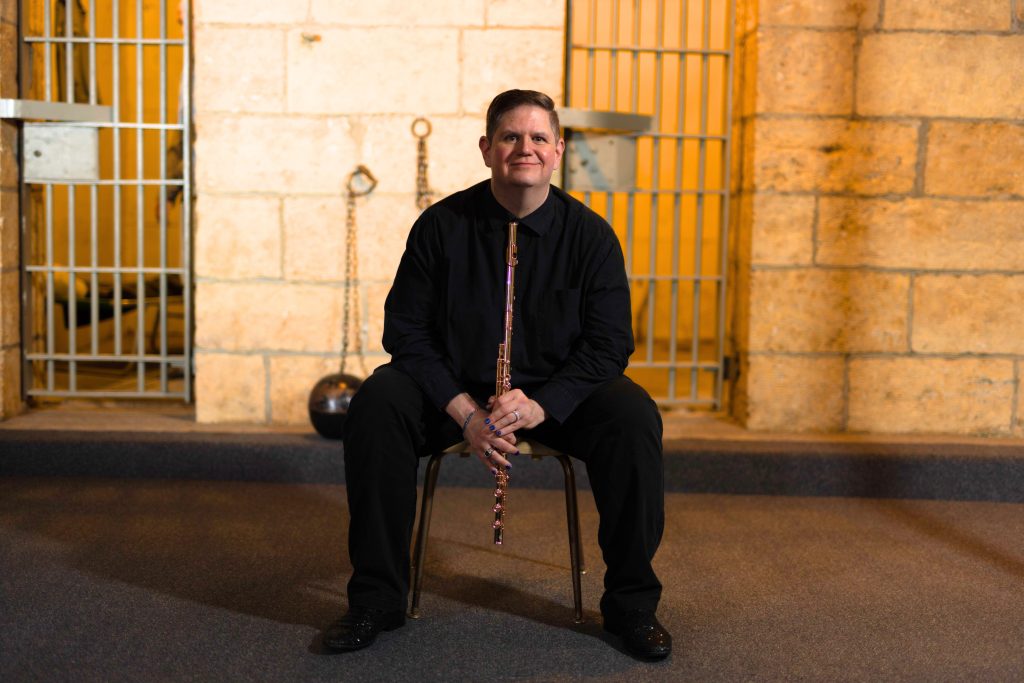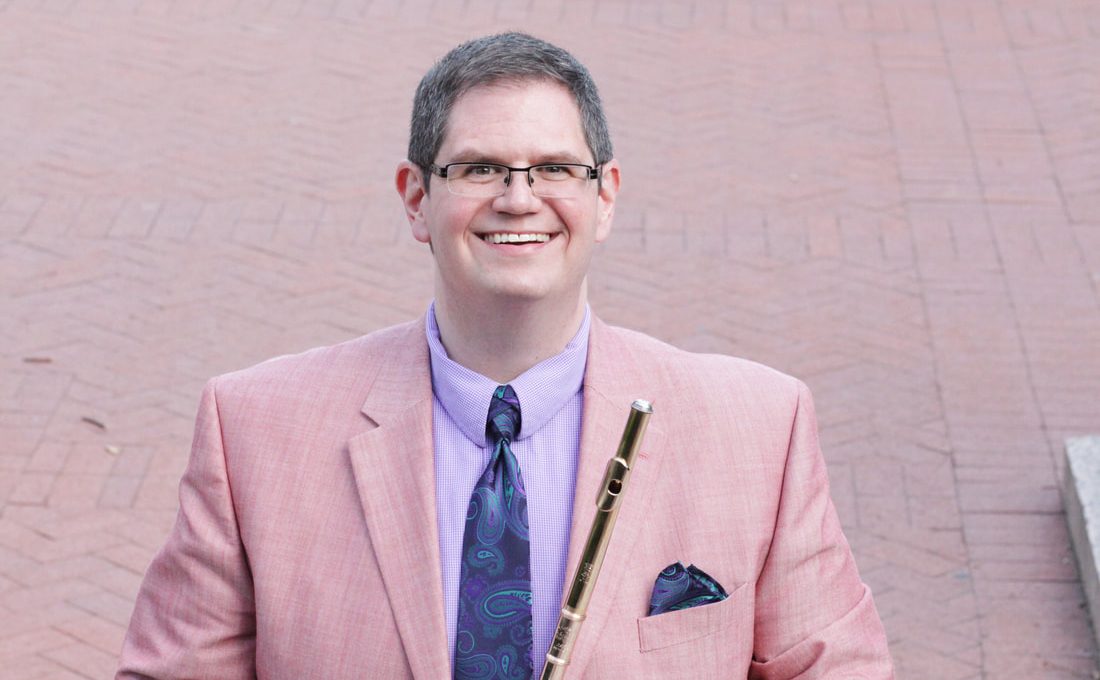Keith had a chance to sit down with Timothy Hagen to discuss what being an artist in Classical music means and the many challenges we all face on that path. Tim has a wealth of knowledge and experience and we are quite lucky to be able to glean a few bits of wisdom from him despite his rather busy schedule.
K: Thank you for allowing me to interview you for The Flute Examiner. I’ve known you for a few years now and have seen your many accomplishments. Out of everything you’ve done and accomplished, what are you the most proud of or what brought you the most joy?
T: First of all, I’m so happy to be with you. The Flute Examiner is such a vital publication that keeps our community connected, learning, and growing. When I think about my own work as an artist, connection and growth are particularly important. A small project that I’m working to make much bigger is a fusion of storytelling and performance I’m calling Flute Mommy. In its pilot state and in another performance project of mine, Dreaming/Being, which I perform with my good buddy and pianist Ben Corbin, audience members in many different places—Texas, North Carolina, New York, Ontario—have had the same reaction, that these programs are among the most interesting, enjoyable classical music experiences they have ever had. Audiences crave new ways of encountering and understanding art, and I’m having a lot of fun playing with different concert formats that offer more opportunities to interact and connect with audiences.
K: You are wonderful player and an excellent teacher. Do you bring your own personal challenges to your teaching? What knowledge do you hope your students can gather from you, musical or otherwise?
T: Thank you for the kind sentiment. I love to play and teach, and any success I have in those areas is rooted in that love. I absolutely bring my own challenges to my teaching. I grew up in a small town set in rural North Carolina. My first band director was not knowledgeable about the flute. The same was true of a couple of my wonderful, subsequent band directors in middle school and junior high who did their best to steer me toward important learning opportunities that supplemented what they could give me. I didn’t have a private instructor until I’d been playing for three years already, and I had developed a lot of bad habits by then that took the next 15 years to completely iron out. Without the intercession of that teacher, Tina Ballard, a terrific student of the legendary Eldred Spell, I wouldn’t have been put on a sustainable path in time to become a professional musician. I give all that background as justification for why I am such a fan of fundamentals in teaching. If I’d gotten solid fundamentals as a kid, my career path might have looked different. I would’ve been prepared for success earlier. I want my students to have an easier path than I did, so we hit fundamentals hard and relentlessly. If you have very fine control over your fundamentals—tone, technique, rhythm, intonation, vibrato, and so on—just add a vivid imagination and educated ears, and you can play anything well and convincingly. Though I love and honor the individual goals each student brings to their flute studies, I hope they all walk away with this lesson learned. Fundamentals are the key that unlocks the door to realizing dreams.
K: What challenges do you think your students face in the field as performers and what advice do you give them about making it as performers?
T: It is more challenging than ever to derive a living from performance. I strive to be direct about this with students interested in performance, not to discourage them but to make sure they know as well as they can what they’re getting themselves into. It’s purely a numbers game: the supply of fine performers outstrips demand in most places. This is why I spend a lot of time exploring career options with students and encouraging them to be flexible. It’s a “performance-plus” mindset: most musicians, myself included, will not be able to make their livings solely through performing, so what else fulfills you? What else do you have aptitude for, or what other skill sets would you be willing to build? Rather than being distressing for students, working in this mindset encourages them to develop themselves as whole people, and many of them find what I found when I decided to swim into waters past performance: career possibilities that bring them excitement and joy.
K: What kind of approach do you take to your own performing that has brought you so much success?
T: I try to stay in a “do my best” mindset. Perfection is not attainable, but optimal playing is. As one of my teachers, the inimitable Jim Walker, once told me, “I love to win, but I don’t hate to lose.” I love this because it acknowledges the ups and downs inherent in a performing career. Each performance is unique, and even with the same program and preparation, some will go better than others. This is why I value performing programs more than once: I get more opportunities to rack up “wins,” or optimal performances. Whether or not a performance is optimal, I prioritize expression and conviction. A gutsy, vulnerable performance with a few notes that go by the wayside in the name of spontaneity and healthy risk-taking is much more captivating to me than one that stops with all the buttons getting pushed in the right way at the right time. I call this “typing,” and one thing’s for sure: like it or hate it, you’ll never catch me merely typing in performance. I’m on stage to connect with an audience and express a point of view, and I think every artist should think the same way.
K: So, how do you define “artistry?” How do you know when you’ve reached that level?
T: Such a well-timed question, since I’ve already referred to classical musicians as artists multiple times here. My definition of artistry is the practice of using art—whether that’s painting, sculpting, dancing, writing, acting, singing, playing an instrument, etc.—to communicate a point of view to an audience for the purpose of moving them in some way. Every human has artistic capability, so every human can choose to be an artist. There is no formal training or process required. Beyond that, whether art and artists are “good” or “bad” is largely subjective, which is why I believe every artist has to find their voice, their point of view, and organize their work around presenting that to audiences to the best of their own ability. And because it bears repeating, the more control they have over fundamentals, the easier their jobs will be. Artistic quality is only largely subjective—rather than completely subjective—because excessive inaccuracies; whether in notes, rhythm, intonation, articulation, etc.; interfere with the audience’s ability to hear and reflect upon the performer’s message.
K: What advice would you give to an aspiring players who what a career in Classical Music?
T: Know that you’re in for an enormous challenge, but also know that there are a whole lot of folks out here working to make that challenge surmountable for you because the role of artists in society is vital. Art is essential to the fully lived life. Can you imagine life without music, movies, shows, design, and dancing? I can’t! I also think we’re living in a time, particularly in the United States, where it’s the artist’s job to work together with our fellow citizens to stir up some purposeful trouble in the service of building a movement to support American artistry the same way other cultures throw considerable national resources behind their artists. Artistic production and engagement should be a line item in every governmental budget at every level, given the immense, data-backed positive effect art has on human well-being. It’s a tall order, but we can make it happen, if we will it so.
K: So, on your path to musical success, have you made any mistakes or regret any choices? What did you learn from your mistakes? How did you approach recovering from your mistakes?
T: SO many mistakes! There’s that old maxim about having no regrets in life, but that’s not possible for anyone who wants to take a risk from time to time. I remember a competition I did in Southern California back in 2004. I advanced to the final round and decided I needed to up the ante by performing a piece from memory in the finals, even though I wasn’t ready for that. I took the risk, crashed and burned, and ended up not even placing. The judges told me afterward that if I had just done what I did in the first round, I would’ve won. The lesson (in addition to how much we overstate memorized performance as a mark of mature artistry) was that I needed to take calculated risks in the future, and even though I regret the wild risk I took in that performance, I’m glad to have learned and grown from it. We’re all going to mess up, even sometimes when we have the best of intentions. Taking accountability and learning and growing from our mistakes—and making amends where necessary—is just part and parcel of being a compassionate human, which is the foundation of artistry.
K: Tim, thank you again for letting me talk with you about your path of success, challenges, and growth. You are such a positive influence in the community. I know your students benefit from your experience and knowledge not to mention your wonderful artistry. We all wish you the best in the future and are so thankful for the opportunity to chat with you. I look forward to seeing you in person in the future.

Praised for his “technical virtuosity and musical sensitivity” (NewMusicBox) and “real flair” (The Well-Tempered Ear), Chicago-based flutist Timothy Hagen (he/they) is a laureate of multiple national and international competitions, including the Myrna Brown Artist Competition and Australian International Flute Competition. He is currently Principal Flute of the Dubuque Symphony, was Principal Flute of the Missouri Symphony from 2009-2016, and has performed with orchestras across the country, including the Minnesota Orchestra, Oregon Symphony, Grant Park Orchestra, Kalamazoo Symphony, San Antonio Symphony, and Dallas Wind Symphony. His award-winning compositions are performed by musicians throughout North America and Europe, and his scholarly writing has appeared in the journals of the National Flute Association (USA) and British Flute Society.
Hagen was identified as a world-class instructor by online conservatory tonebase, where his courses on flute repertoire can be found alongside courses by faculty members from top musical organizations such as the Juilliard School, Rice University, University of Michigan, Peabody Institute, and the symphony orchestras of Pittsburgh, St. Louis, and Detroit. He is on the faculty of Clarke University in Dubuque, IA, and has taught at Central Michigan University, the University of North Carolina-Greensboro, University of Wisconsin-Whitewater, Oklahoma State University, The University of Texas at Austin, and Brookhaven College, as well as in partnerships with the Los Angeles Philharmonic, Lincoln Center Education, and Dallas Symphony. He completed his studies at the UNC School of the Arts, University of Southern California, Colburn School, and UT-Austin, and his teachers include Marianne Gedigian, Jim Walker, Philip Dunigan, Renée Siebert, Tadeu Coelho, Chelsea Czuchra, Felicia McNaught, and Tina Ballard.

